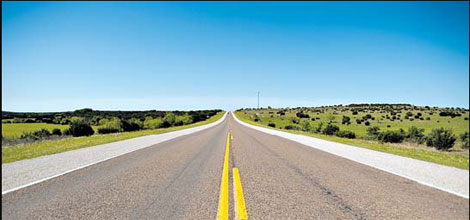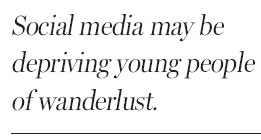There's no place like home
 |
|
Humans have a natural restlessness, but the desire to hit the road is countered by feelings of homesickness once home has been left behind. Matt Nager for The New York Times |
"I'm shaking the dust of this crummy little town off my feet and I'm going to see the world."
So vows George Bailey in Frank Capra's 1946 film "It's a Wonderful Life." But despite years of trying, he never does leave Bedford Falls. The story follows the tribulations of George, played by Jimmy Stewart, as he realizes how much he values his roots in that crummy little town (with help from an angel named Clarence).
Many of Jack Kerouac's characters, on the other hand, fled small-town values. In "On the Road," his seminal 1957 novel of rootless beatniks racing across America in an amphetamine rush of jazz and poetry, mobility is sacred. "There was nowhere to go but everywhere," Kerouac wrote, "so just keep on rolling under the stars."
As David Brooks pointed out in The Times, the Capra and Kerouac worldviews have long been in conflict. Humans have a natural restlessness that has driven them across continents for millennia. But leaving home can be emotionally devastating.

Mr. Brooks stressed that science supports Capra - for many people, roots, community and family are pre-eminent. "The happiness research," Mr. Brooks wrote, "suggests that 'It's a Wonderful Life' is correct and 'On the Road' is an illusion."
And though we live in an ever more mobile world, with many people migrating to pursue economic opportunities, homesickness is a scourge.
Susan J. Matt, the author of "Homesickness: An American History," wrote in The Times that moving extracts a wrenching emotional toll, despite the benign-sounding 19th-century clinical name for homesickness: "nostalgia."
Today, the emphasis on opportunity makes homesickness a secret. "This silence," she wrote, "makes mobility appear deceptively easy." Yet one study found that Mexican immigrants in the United States suffered 40 percent more depression and anxiety than their relatives remaining at home.
And as for the "comforting illusion" of technology? "If they could truly vanquish homesickness and make us citizens of the world," Ms. Matt writes, "Skype, Facebook, cellphones and e-mail would have cured a pain that has been around since 'The Odyssey.'"

Americans celebrate rootlessness in their national mythology (Kerouac is but one writer in that tradition). It is, after all, a nation of immigrants.
But those myths may be fading. Todd G. Buchholz and Victoria Buchholz wrote in The Times that "young Americans have become risk-averse and sedentary," and despite an 8.3 percent unemployment rate, few want to leave their hometowns in search of better jobs. Indeed, with social media, few want to leave their homes at all.
"Maybe it's time," they wrote, "to yank out the power cords, pump up the flat bicycle tires and even reopen Route 66 - whatever it takes to get our kids back on the road."
But young Americans may be heeding the lessons of Kerouac himself, who died a shattered alcoholic in 1969, without ever having put down real roots. Toward the end of his life, Kerouac often dreamed of Lowell, Massachusetts, the small New England city not unlike Bedford Falls, where he was raised.
"A very eerie, recurrent dream," he said, "but it always makes me happy when I wake up."
For comments, write to nytweekly@nytimes.com
The New York Times






















